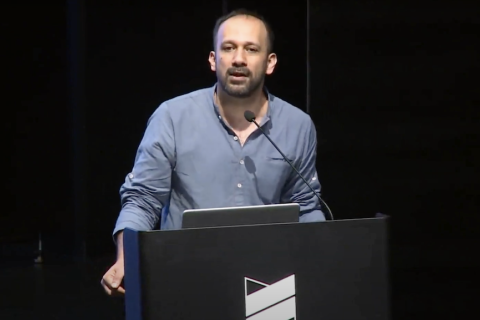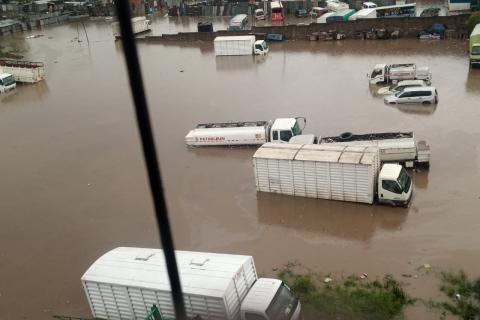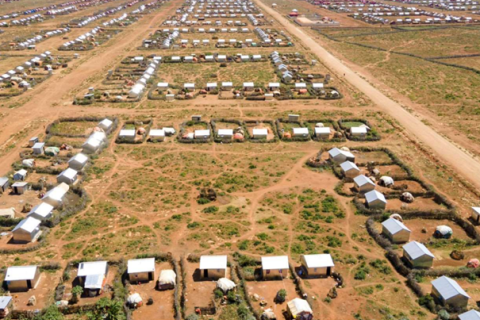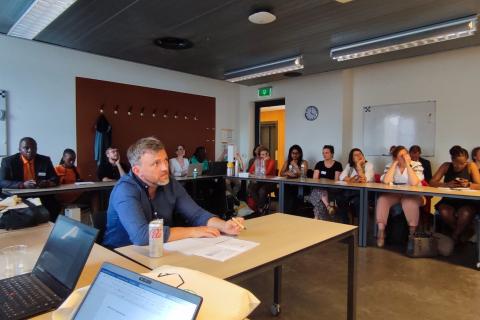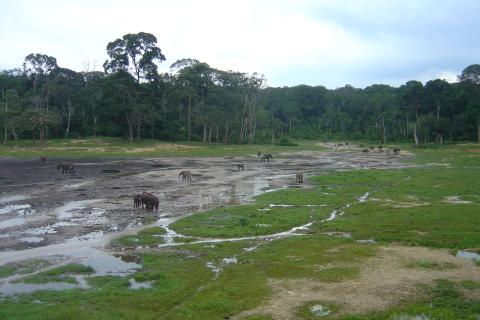Kenya's Devastating Floods: A Stark Reminder of our Land Stewardship Role
My heart aches for all those who have lost their loved ones from the tragedy facing Kenya today as the death toll nears 100. Heavy rains have lashed Kenya in recent weeks, causing widespread flooding that has displaced thousands, destroyed infrastructure, and devastated livelihoods. In the interest of student and staff well-being, the Ministry of Education has announced a delay in school re-opening. While these seasonal floods are not uncommon, the severity of this year's event highlights a crucial issue: our relationship with land.
Understanding the link between Climate & LAND-at-scale country projects - Sustainable Solutions for Rural-Urban Migrants in Baidoa, Somalia
As part of a scoping study titled Land Governance for Climate Resilience: A review and case studies from LAND-at-scale projects headed by Richard Sliuzas, Emeritus Professor, University of Twente, IOM explored how climate plays a role in the UN-led Saameynta Joint Programme in Somalia. In this context, climate change is increasingly recognized as a multiplier of insecurity and fragility, where climate-related sudden and slow-onset disasters are driving people to leave their land and migrate. While migrating allows people to find alternative livelihoods and enhance their climate resilience, it can also be associated with instances of maladaptation to climate change. As such, this case highlights durable solutions in climate-driven urban sprawl in Baidoa.
Does strengthening land governance align with fair climate transitions?
Communities in developing countries are increasingly exposed to the effects of climate change. Although they contribute little to greenhouse gas emissions, many communities are at the forefront of climate change and the associated extreme events. They are faced with events that undermine their food security, such as droughts and floods, but also increased pressure on land due to climate-induced migration. In this session, we delved into the nexus of climate change and land governance.
Promoting training of Central Africans in land governance for poverty reduction
1) Prof. Ngana, why did you launch this training unit on land issues at the University of Bangui? What needs does the training meet?
It was NELGA that motivated us. I am the Focal Point for NELGA in the Central African Republic. As part of the implementation of its structure in Central African universities, NELGA had launched a survey to revise the curriculum of land governance.
KZN floods — the dangerous cocktail of traditional authorities and local government
Traditional leaders assign land giving little consideration to spatial planning for long-term, sustainable settlement. People are settled in places unsuitable for human habitation. And climate change will bring added volatility and exposure.
The accelerating need for Urban Green Spaces (UGS) in cities and how to best accommodate it
Urban Green Spaces (UGS) are vegetated open spaces that provide a multitude of ecological functions that are essential for the physical and mental well-being of the citizens as well as for the urban environment. However, land is an extremely competitive resource in cities that are struggling to sustain the ever-growing urban population and UGS are constantly under threat of urban encroachment. Even the well spread out cities are pressured to densify by the more commonplace ‘sustainable dense urban neighbourhood’ approach that in turn, increases the pressure on open spaces such as UGS.
Sustainable corridors? Urban land and mobility infrastructure development in an era of climate change
This session aimed to generate discussions on different experiences of infrastructure development that addresses climate change in cities. It paid particular attention to new transportation “corridor” development, which has increasingly become popular as a way to redesign the rapidly growing city to reduce traffic congestions and thereby carbon emissions, promote affordable public transportation system, and to make public green spaces accessible for all the citizens. However, it is known that it significantly affects ways that urban land is used, accessed and governed by local communities.
The Big Read: As clamour grows for preservation in land-scarce Singapore, something’s got to give
While green groups spoken to agreed that the Government has become more receptive to their views, they believe it is now time to put conservation or preservation at the front and centre of future development projects.
By Navene Elangovan for Channels News Asia (CNA) Singapore
What a rapidly urbanising Africa can learn from China’s experience
The parallels between Africa and China’s urbanisation trajectories could offer policymakers potential policy design lessons to learn from. For example, some of China’s recent successes in managing urbanisation, if adequately adapted to the unique and diverse African context, could potentially help the continent’s burgeoning city growth become more sustainable and equitable – but only with careful consideration of local circumstances.
Housing and Land Rights in Kenya
Globally, the UN estimates that 1.6 billion people struggle to find adequate housing. Kenya’s Constitution Article 43(1) (b), provides that ‘every person has the right to accessible and adequate housing and reasonable standards of sanitation’. Kenyans suffer insecurity of tenure and are victims of frequent forceful evictions. This is a country that never follows up on building standards, leave alone rent controls. The current leadership is money-minded and has no interest in public housing.

